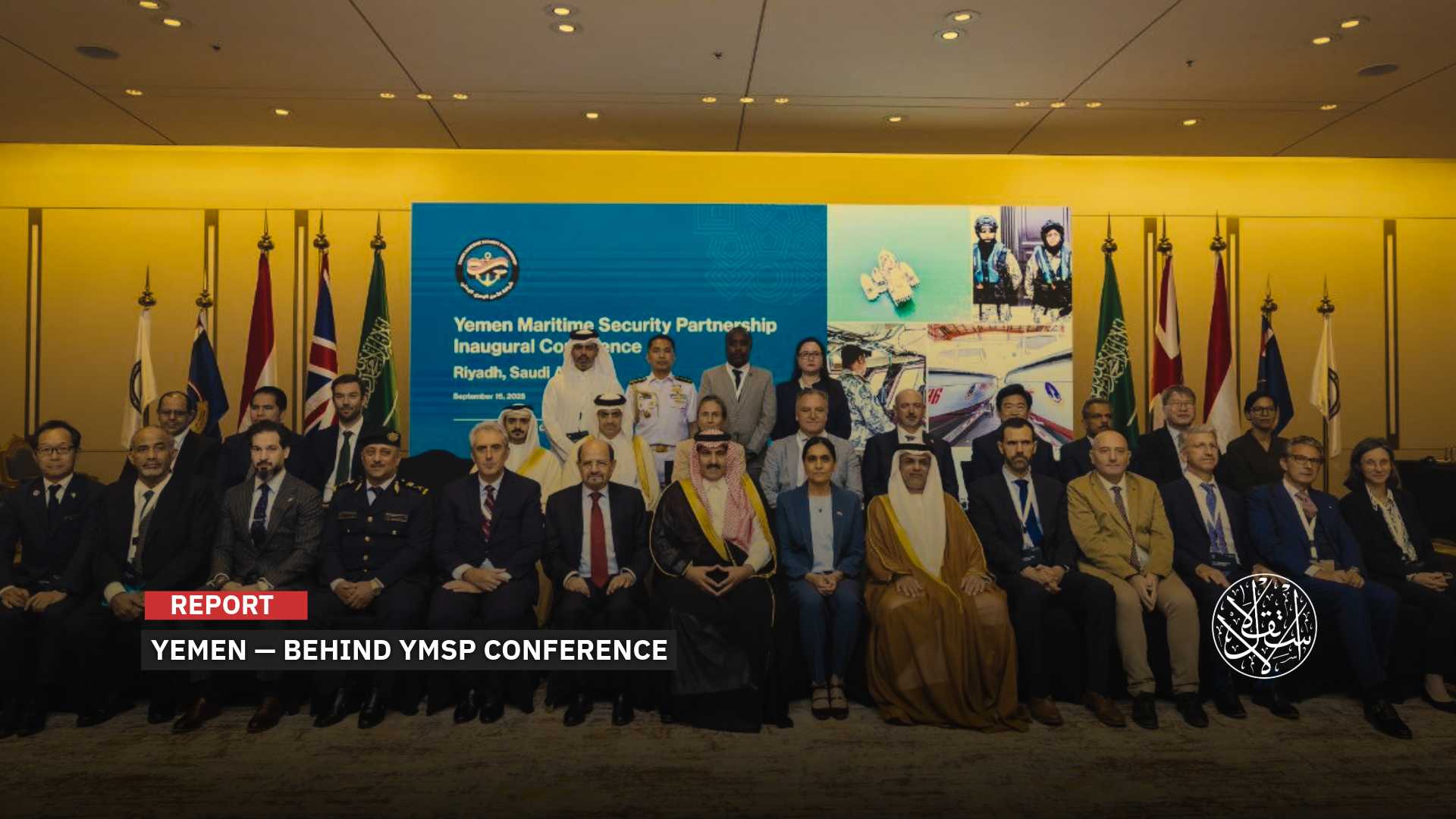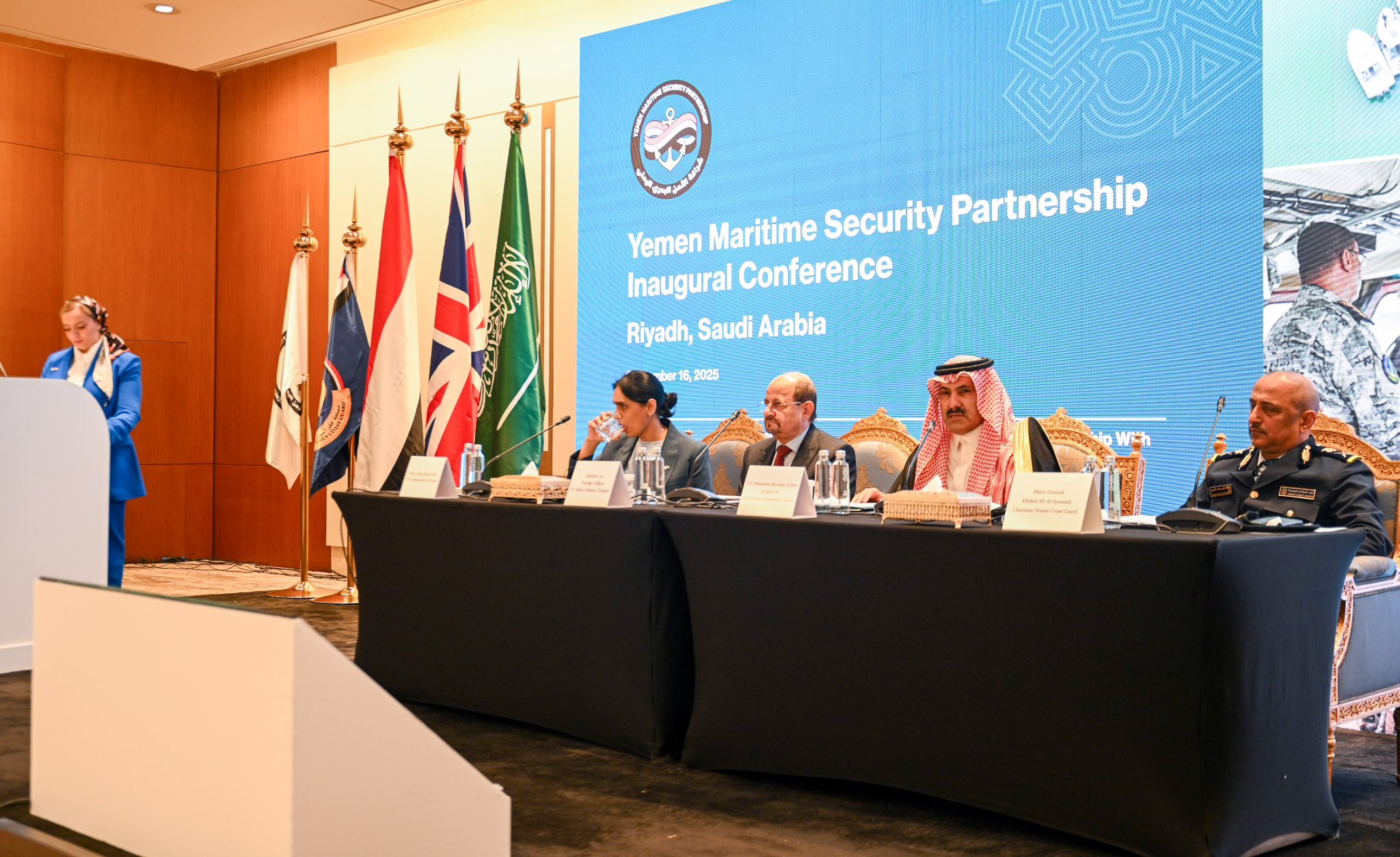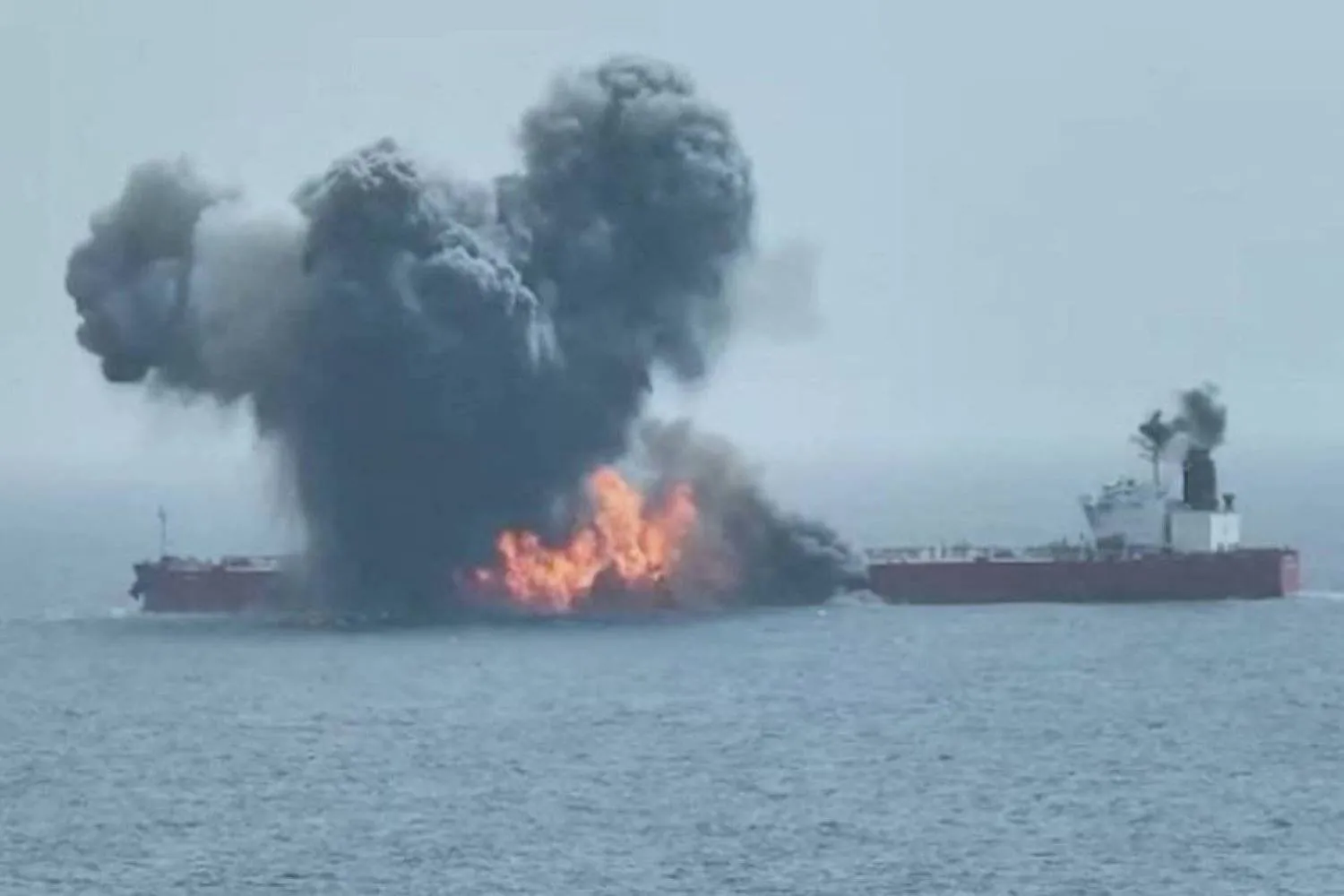Money Promises and a Saudi Summit: Why Yemen’s Coastline Is Drawing So Much Attention

“The international community seems eager to avoid direct confrontation over maritime security.”
The Yemeni Maritime Security Partnership (YMSP) conference in Riyadh, which brought together representatives from 40 countries, sparked questions about the reasons behind the initiative, its timing, and what impact it might have on the ground.
Held on September 16, 2025, the event was organized by Saudi Arabia and the United Kingdom in cooperation with Yemen’s internationally recognized government. Five international organizations also took part, with the aim of shaping a decade-long strategy to strengthen maritime security in Yemen.

Financial Pledges
The conference aims to secure financial pledges from participating countries to rebuild Yemen’s civilian maritime security capabilities, Saudi newspaper Okaz reported on September 16. It will also mark the launch of a joint secretariat for maritime security in Yemen.
Okaz reported that the initiative is designed to combat smuggling, piracy, and human trafficking while strengthening Yemen’s ability to safeguard its coastline and vital sea lanes. The conference is discussing a decade-long strategy to rebuild and modernize the Yemeni coast guard, thereby enhancing the country’s role in safeguarding international trade routes and ensuring safe navigation in the Red Sea and the Gulf of Aden.
James Kariuki, the UK’s Deputy Permanent Representative to the United Nations, stated that YMSP is an essential mechanism for international cooperation aimed at protecting Yemen’s waters, safeguarding maritime trade, combating illicit activities, and rebuilding the Yemen Coast Guard's capabilities. “The UK is proud to co-host the inaugural YMSP High-Level Conference on 16 September in Riyadh, alongside the Kingdom of Saudi Arabia. We call upon our international partners to join and support this initiative,” he added.
Yemen’s Presidential Leadership Council chief, Rashad Mohammed al-Alimi, described the conference as the beginning of a new partnership that will enhance the security of maritime corridors and reaffirm his government’s commitment to protecting national interests and the Yemeni people.
Yemen’s Information Minister Moammar Eryani welcomed the launch of the partnership in a post on X, calling it a strategic step that reflects international partners’ commitment to helping Yemen confront diverse challenges and threats.
He added that the initiative would bolster maritime security, safeguard global trade routes, fight piracy and smuggling, and support sustainable economic development in Yemen and the wider region. Eryani praised the international effort and thanked Saudi Arabia and the United Kingdom for leading what he described as a responsible partnership and a forward-looking vision for a safer, more stable future for Yemen, the region, and the world.
The conference takes place against the backdrop of Yemeni government accusations that Iran continues to smuggle weapons to the Houthis, who have been attacking ships in international waters since November 2023. These attacks have been carried out under the banner of supporting Gaza, which has been subjected to Israeli Occupation genocide for two years.

A Tactical Step
Commenting on the conference and its impact on the ground, Yemeni writer and political analyst Yassin al-Tamimi said it was “a surprising move,” but one that will not close the existing security gap created by the continued flow of weapons to the Houthis, which enables them to influence maritime navigation, a matter of international concern.
“Despite the importance of the step in strengthening the Yemeni Coast Guard, in the end, the force does not reflect a unified Yemeni decision or serve as the state’s security arm. Rather, it distributes the benefits of the grants it receives among Coast Guard units controlled by different Yemeni factions,” he told Al-Estiklal.
“This explains why the initiative received support from across the spectrum, including Rashad al-Alimi, head of the Presidential Leadership Council, Aidarus al-Zubaidi, head of the Southern Transitional Council, and other Yemeni actors.”
“At first glance, supporting the Coast Guard appears to be a substitute for international monitoring once carried out by powerful fleets with advanced technology to track weapons smuggling to the Houthis. Now the task is being shifted to Yemeni state institutions whose political leadership remains divided,” al-Tamimi added.
The political analyst suggested the move may have been prompted by an incident in mid-July 2025, when the Red Sea Coast Guard under Brigadier General Tareq Saleh in Mokha intercepted a ship carrying nearly 70 tons of weapons destined for the Houthis.
According to al-Tamimi, that operation likely paved the way for the donor conference, which was held with relatively low diplomatic representation and led by the Saudi ambassador to Yemen, Mohammed al-Jaber, and the British ambassador, Abda Sharif.
“This conference envisions the Coast Guard as capable of monitoring maritime security,” he said. “But I believe there is exaggeration in this assumption. The real outcome will likely be limited to enhancing Coast Guard capacity, especially when it comes to weapons that could reach the Houthis.”
Al-Tamimi doubted the force could secure sea lanes on its own, particularly in Yemeni waters, noting that the financial pledges were modest. The European Union committed just over two million euros, while Saudi Arabia offered four million dollars. “These amounts are far below what is required,” he said.
For the Coast Guard to intercept weapons shipments effectively, it would need advanced technology, vessels capable of interdiction and maritime operations, and trained personnel, all requiring resources far greater than those promised, let alone directly allocated, according to the analyst.
“The international community seems eager to avoid direct confrontation over maritime security. This step does not mean the missions of the European Union or the United States have ended. The Coast Guard will receive support, but international actors will continue to operate separately. In the end, the conference is a tactical step meant to send a message that the mission is being entrusted to the Yemeni Coast Guard as the legally recognized authority to carry it out,” al-Tamimi concluded.

Ongoing Attacks
Houthi strikes on commercial shipping paused briefly after a deal with Washington in early May 2025 but resumed just two months later. In July the group sank two Greek cargo vessels in the Red Sea as they were heading toward Israeli Occupation ports.
The United States condemned the attacks, calling them “terrorist and unjustified,” and warning that they underscored the ongoing threat posed by Iran-backed Houthis to regional trade and maritime security. “We call on Council Members to ensure the functioning of the Yemen Panel of Experts, a critical tool in providing this Council with information about violations of the arms embargo under Security Council Resolution 2216,” said U.S. Ambassador to the UN Dorothy Shea.
“The United States remains committed to depriving the Houthis of the resources that sustain their terrorist actions and network.”
Shea also accused Tehran of coordinating with the Houthis to attack “Israel,” saying this underscores the need for the Security Council’s constant vigilance.
According to a Reuters report on July 10, the Houthis sank the Eternity C and Magic Seas, marking their first escalation in seven months. The Eternity C attack left four sailors dead, ten rescued, and 11 missing, while the Magic Seas crew was evacuated to Djibouti.
Since November 2023, the Houthis have carried out more than 100 attacks on commercial shipping, sinking four vessels, seizing another, and killing at least eight sailors, the report said.
One of the deadliest strikes came in August 2024, when the Greek tanker Sounion, carrying 150,000 tons of crude oil, was hit by missiles and drones, sparking fires that took months to extinguish. Two months earlier, the coal carrier Tutor sank near Yemen’s Hodeidah port after a missile barrage and a remote-controlled explosive boat attack. One crew member was never found.
In March 2024, a missile strike on the Greek-owned True Confidence, sailing under a Barbadian flag, killed three crew members, the first confirmed fatalities of the Houthi campaign. That same year, in February, the UK-owned Rubymar was struck and sank in early March. The Greek vessel Zografia, en route from Vietnam to “Israel” with 24 crew members, was hit off Yemen’s Salif port in January.
The Houthis’ first target was the Polish-operated Galaxy Leader, flagged to the Bahamas. Its 25-member crew was seized in international waters in November 2023 and held for over a year, only being released in January 2025.
Western powers responded in January 2024, with the U.S. and UK forming a coalition of more than 20 countries under the banner “Operation Prosperity Guardian,” launching airstrikes against the Houthis.
In a surprise announcement in May 2025, U.S. President Donald Trump declared that the Houthis had “surrendered,” halting attacks on shipping in exchange for the suspension of U.S. airstrikes after more than 1,000 sorties.
Sources
- Qatar Participates in Yemen Maritime Security Partnership Conference
- Saudi Arabia, UK Launch International Partnership to Strengthen Yemen’s Maritime Security
- International Conference Emphasizes Importance of Yemen and Saudi Coastal Security, Announces $4 Million Support
- Trump announces deal to stop bombing Houthis, end shipping attacks
- International Effort to Protect the Gulf of Aden and the Arabian and Red Seas: Riyadh Pledges $4 Million to Support the Yemeni Coast Guard [Arabic]
- International Effort to Protect the Gulf of Aden and the Arabian and Red Seas: Riyadh Pledges $4 Million to Support the Yemeni Coast Guard [Arabic]









